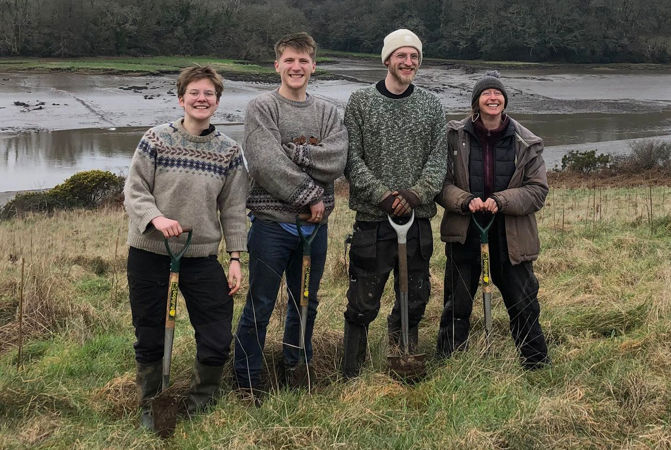Using nature-based solutions to support water quality improvements in Pembrokeshire

A Natural Resources Wales (NRW) project on the Western Cleddau river in Pembrokeshire is harnessing the power of trees to reduce nutrient pollution and improve water quality.
Approximately 6,500 trees have been planted along the banks of the river near it’s confluence with the Eastern Cleddau, to soak up excess nutrients from agricultural land run off.
The corridors of trees, averaging 14metres in width, act as buffer strips between farmland and the river and have been planted on non-productive land. They have been introduced with the full support of the landowner, who was eager to introduce positive environmental change.
As well as providing benefits to the Special Area of Conservation river, the new trees will provide connection with existing natural woodland on the land, benefiting a range of plant and wildlife species.
The trees were planted by contractors Coed Porffor/Purple Trees and the planting operation took five planters five full days to complete.
Separately, the project has also seen over 1000m of new fencing installed to prevent livestock accessing the river.
Andrew Lewis, from NRW’s Marine Projects team said:
“The Western Cleddau and Milford Haven estuary are incredibly special places, designated for a range of rare and threatened species and habitats including lamprey, otter, mudflats and marshes.
“We’re grateful for the support of the landowner, who allowed us to undertake such large-scale tree planting on the land. We worked closely with the landowner to develop this project and identify suitable areas of land which were least productive.
“In years to come, these trees will act as an important filter, reducing the amount of excess nutrients reaching the Western Cleddau, that are impacting the Special Area of Conservation river and estuary.”
The Western and Eastern Cleddau rivers converge at Picton Point to form the Daugleddau estuary at Milford Haven. The estuary is designated as a Marine Special Area of Conservation, while significant stretches of its coastline are also designated as a Site of Special Scientific Interest.
The Western Cleddau faces significant water quality challenges, predominantly due to nitrate, phosphate and sediment pollution. These pollutants contribute significantly to water quality failures in the catchment under the Water Framework Directive (England and Wales) Regulations 2017.
The project has been funded by the Welsh Government’s Water Capital Programme, which supports a number of environmental priorities including river restoration, metal mine remediation, fisheries and water quality.
It supports similar initiatives being undertaken in the area to improve the Western Cleddau, including river restoration efforts undertaken by the Pembrokeshire River Restoration Project.
